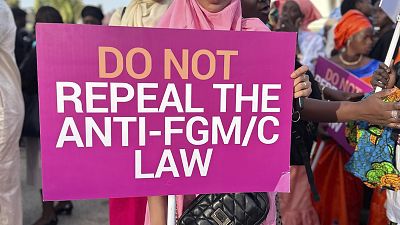Gambia
An attempt to repeal a 2015 ban on female genital cutting in Gambia was sent for further committee discussions by lawmakers on Monday. Gambian activists fear the passage of the bill would overturn years of work to better protect girls and women.
The legislation was referred to a national committee for further debate and could return to a vote in the weeks and months ahead.
Activists in the largely Muslim country had warned that lifting the ban would hurt years of work against a procedure often performed on girls under age five in the mistaken belief that it would control their sexuality.
The procedure, which also has been called female genital mutilation, includes the partial or full removal of external genitalia, often by traditional community practitioners with tools such as razor blades or at times by health workers.
It can cause serious bleeding, death and childbirth complications but remains a widespread practice in parts of Africa.
Jaha Dukureh, the founder of Safe Hands for Girls, a local group that aims to end the practice, told The Associated Press she worried that other laws safeguarding women’s rights could be repealed next.
Dukureh underwent the procedure and watched her sister bleed to death.
“If they succeed with this repeal, we know that they might come after the child marriage law and even the domestic violence law. This is not about religion but the cycle of controlling women and their bodies,” she said.
The United Nations has estimated that more than half of women and girls ages 15 to 49 in Gambia have undergone the procedure.
The bill is backed by religious conservatives in the nation of less than 3 million people.
Its text says that “it seeks to uphold religious purity and safeguard cultural norms and values.”
The country’s top Islamic body has called the practice “one of the virtues of Islam.”












02:15
Sierra Leone debates decriminalizing abortion
01:58
Namibia swears in first female president
Go to video
How technology can support more sexual assault survivors in South Sudan
05:00
Fatoumata Maiga: A woman leading Mali’s fight for peace
05:33
Celebrating the strength and resilience of African women in Paris
12:00
UN Women’s report exposes significant setbacks in gender rights